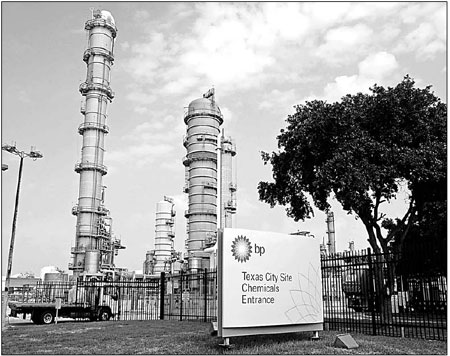Lawyers: BP broke law to get permit
 |
| A sign marks the entrance to a BP refinery in Texas City, Texas. Craig Hartley/Bloomberg News |
The permit, which governs BP's Texas City, Texas, refinery, allowed the company to operate its largest refinery without replacing outdated emissions controls, such as the one that exploded in March 2005, killing 15 workers. Texas law requires applications be rejected when the people involved worked on both sides of the permitting process.
The engineer "changed sides and worked on the other side of this same thing for BP, representing BP against the state?" a lawyer for some of the injured workers asked Watson Dupont, a safety manager at the Texas City plant in a November 15 deposition, portions of which were made public in court filings on Friday.
"He worked for BP in 2003 on the third draft of the flex permit, yeah," Dupont replied, referring to BP Senior Air Engineer Rueben Herrera, a former permitting engineer at Texas Council for Environmental Quality. The group regulates industrial emissions.
BP has denied any improprieties in its air-permitting process.
Convincing jurors that BP committed fraud in obtaining its refinery-emissions permit may expose the company to more than $1 billion in punitive damages in the civil trial which opened yesterday in state court in Galveston, Texas. The judge presiding over those claims has allowed lawyers to use evidence alleging BP fraudulently obtained its air permit to lift the state's limit on such damages.
To date, BP has avoided a jury verdict by settling all but about 1,200 of the 4,000 blast-related injury and property claims from the blast, which injured hundreds and broke windows as far as eight kilometers away.
The company has admitted responsibility for the explosion and has been settling claims from a $1.6 billion fund set aside for that purpose.
Lawyers suing the company have also cited air-quality fraud allegations in their attempts to derail BP's criminal plea deal, set for a separate hearing today in Houston federal court. The workers' lawyers are seeking as much as $2 billion beyond the $50 million fine already imposed.
'Shockingly lenient'
Last month, BP agreed to plead guilty to exposing workers to toxic emissions during the Texas City explosion, trying to corner the propane-trading market and spilling 200,000 gallons of oil from corroded Alaskan pipelines.
The plea bargain, with combined fines of $373 million, would end BP's federal criminal liability from the blast and the spills.
In court papers objecting to BP's deal, victims' lawyers claim the company's $50 million fine and blanket immunity from further prosecution over the Texas City explosion are "shockingly lenient".
Mark Lanier, in a filing on Friday in Houston federal court, singles out Herrera's involvement on both sides of BP's air-quality permit for the Texas City refinery as proof that BP "flagrantly violated a variety of regulatory and ethical guidelines to ensure its criminal acts could proceed apace".
"Herrera did secure the necessary permits despite the fact that such action was itself a crime," Lanier said in his objections to BP's plea. Lanier said the plea doesn't punish BP's "breathtaking acts of criminality".
No deception
In hearings since September 2006, BP's lawyers have repeatedly told State District Judge Susan Criss, who is overseeing the civil case, that the company didn't break any laws regarding its Texas air-quality permits.
Last year, Criss ruled she would allow jurors to consider evidence that BP may have falsified documents to fraudulently obtain its permits against the company for punitive damages purposes.
"Herrera testified many months ago, and it was incredible what we heard," Criss told civil lawyers during a November 12 pretrial hearing, referencing Herrera's prior testimony on the permits.
"He indicated it was a criminal act for him to have left that agency and gone to work for BP," Criss said.
"We did not deceive the TCEQ," BP spokesman Neil Chapman in Houston said in an interview on Sunday. "We've testified in court that Mr. Herrera did not work on any environmental application relating to the Isomerization unit or the raffinate splitter while at TCEQ."
Chapman declined to explain how Herrera's work on BP's flex-permit, which covers pollution emissions for the entire Texas City plant, wasn't applicable to permits for the two units that exploded.
BP payroll
The two operating units Chapman mentioned caused the March 23, 2005, explosion, which occurred when an octane-boosting unit overflowed while being restarted after repairs. Gasoline vapors spewed into an inadequate emission-control system and ignited in a blast that injured hundreds.
Don Lambright, Herrera's lawyer, declined to comment.
In a 2006 hearing before Criss, Herrera denied working on the same air-quality permit application as both a BP employee and a state regulator.
He said he put BP's application "on the shelf" and didn't work on it because he knew he was leaving the agency for an industry job. Herrera left TCEQ in February 2003 and joined BP's payroll the following month, according to court papers.
Bloomberg News
(China Daily 11/27/2007 page16)














